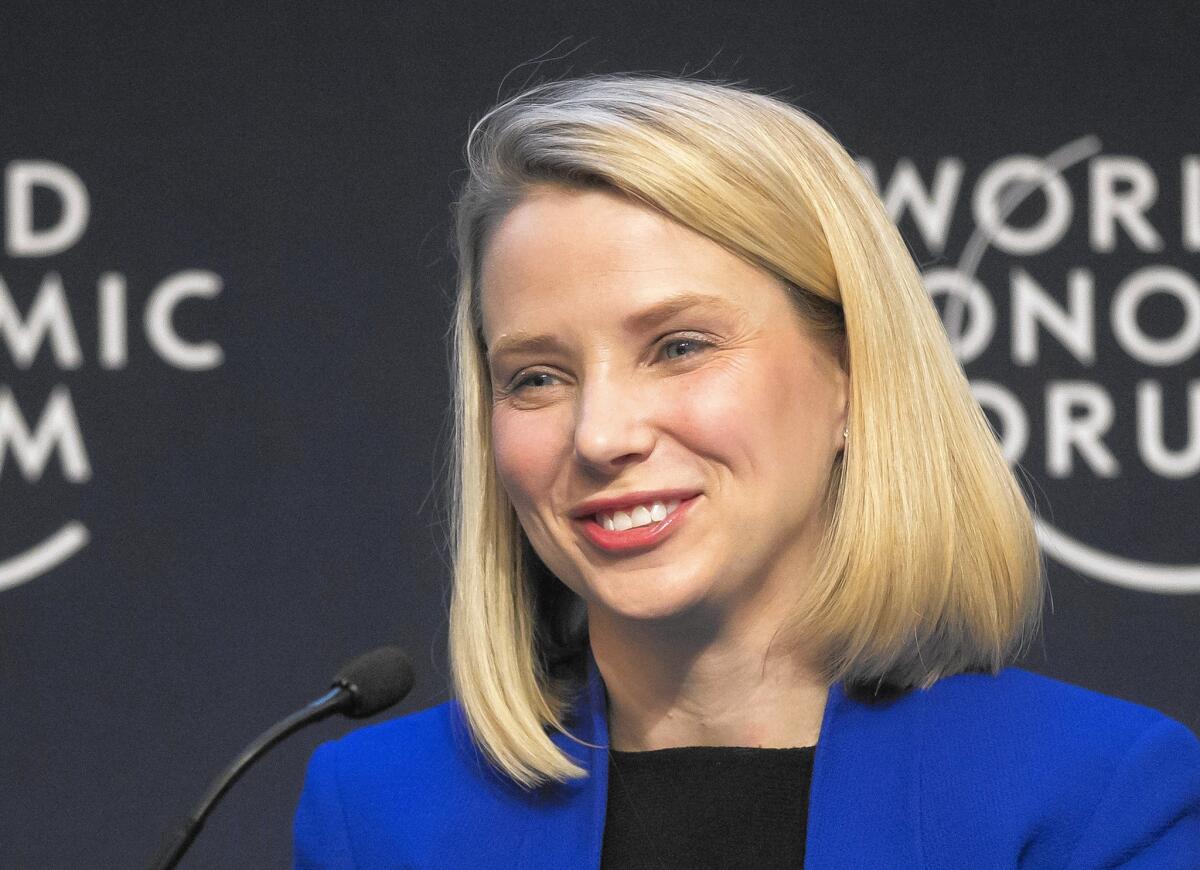Younger executives are sharing more details about their personal lives

The day after announcing that Yahoo’s board would examine spinning off its core business, CEO Marissa Mayer revealed that her identical twin girls were born that morning.
- Share via
Birth announcements by major corporate CEOs are hardly a frequent occurrence. Yet in the span of a month, we’ve gotten two of them, each one stunning in its own way.
On Dec. 1, Facebook Chief Executive Mark Zuckerberg announced the arrival of his daughter, along with that little bit of news about planning to give away 99% of his Facebook stock.
A week and a half later — the day after announcing that Yahoo’s board would examine spinning off its core business — Yahoo CEO Marissa Mayer had more big news to share. Her identical twin girls were born that morning.
“Our whole family is doing great!” she said on her Tumblr blog. “Thanks to everyone for all of the support and well wishes throughout my pregnancy.”
The coincidental timing has something to do with age: At 31 and 40, Zuckerberg and Mayer are two of the youngest chief executives in the S&P 500 and, unlike the typical CEO in his mid-50s, are at a time in their lives when people tend to have babies and take parental leave. Perhaps as more young companies take off with similarly young CEOs at the helm, we’ll see more such announcements.
Yet it’s also a sign of the increasing ways that business leaders are choosing to reveal more about themselves — albeit in their own carefully scripted ways — as well as the heightened expectations we have for them to do so.
When Zuckerberg first shared the news he and his wife were expecting a baby, for instance, he also revealed they had suffered through three miscarriages. Facebook Chief Operating Officer Sheryl Sandberg has grieved openly online this year after her husband died in a tragic accident.
As leaders at a social media company, one might argue that’s to be expected. But they’re not alone.
Apple CEO Tim Cook, known as incredibly private, penned an essay in which he publicly shared last year that he is gay. In March, Google’s then chief financial officer wrote a candid and personal resignation letter in which he talked about struggling with work-life balance. He was “always on — even when I was not supposed to be. Especially when I was not supposed to be,” and he believed that he owed his wife more.
Aetna’s CEO, Mark Bertolini, speaks openly about an accident that nearly ended his life, as well as his yoga and meditation practice. “We program CEOs to be certain kinds of people. We expect CEOs to be on message all the time,” Bertolini told a New York Times reporter. “The grand experiment here has been how much of that do you really need to do?”
These could all be nothing more than examples of people who — whether in an attempt to inspire others, thank a family member or highlight their personal brand — chose to open up more than we’re accustomed to hearing from powerful people in the corporate suite. And for every CEO who speaks freely, there’s one who chooses to keep an illness private. Mayer, for one, may be sharing the good news and basic details about her maternity leave (as she did with her first child in 2012), but it’s hardly a topic she’s dwelling on beyond that.
Still, there appears to be a growing awareness by business leaders that we now live in a world where sharing details is not only valued but expected. Talking about the things that happen in their lives outside of work makes them both more accessible and more credible, particularly among the swath of their workforce who are millennials.
As Facebook’s head of human resources, Lori Goler, told On Leadership recently, her colleagues said they felt like they didn’t know her until she started sharing more about her personal life. It was a big lesson in personal transparency and authenticity, Goler said, and one that she believes is “a really important leadership trait,” particularly for “a generation that expected that from its leaders.” If Zuckerberg, Mayer and others are a sign, we’re likely to see much more of it.
Jena McGregor writes a daily column analyzing leadership in the news for the Washington Post’s On Leadership section.
More to Read
Inside the business of entertainment
The Wide Shot brings you news, analysis and insights on everything from streaming wars to production — and what it all means for the future.
You may occasionally receive promotional content from the Los Angeles Times.










